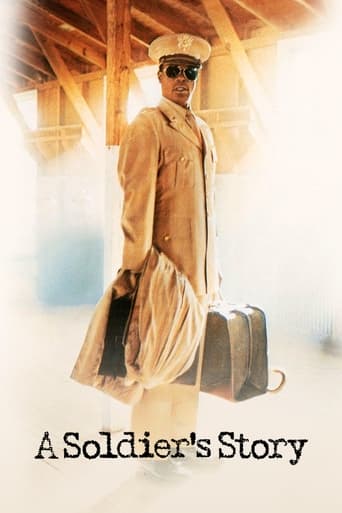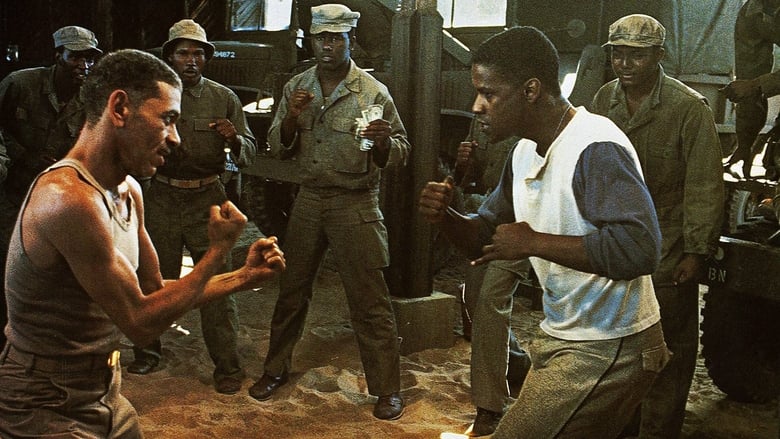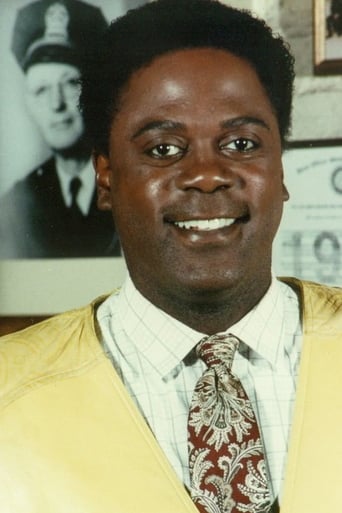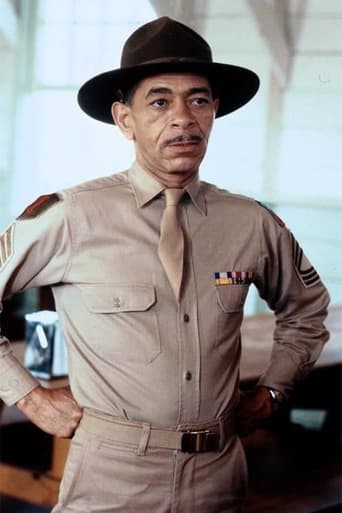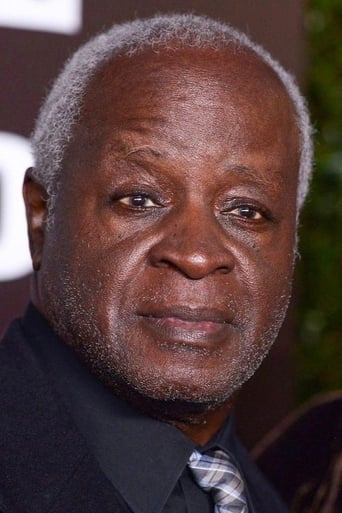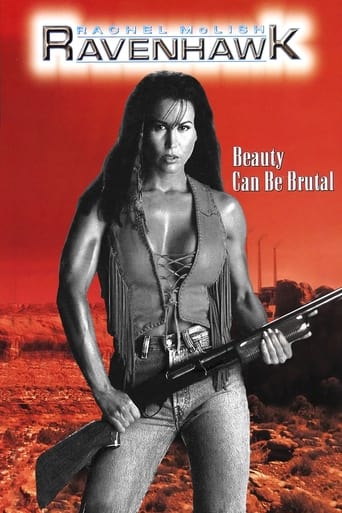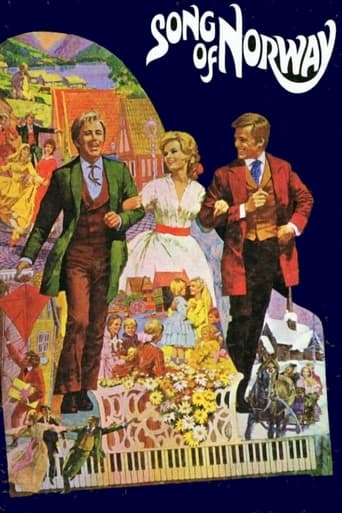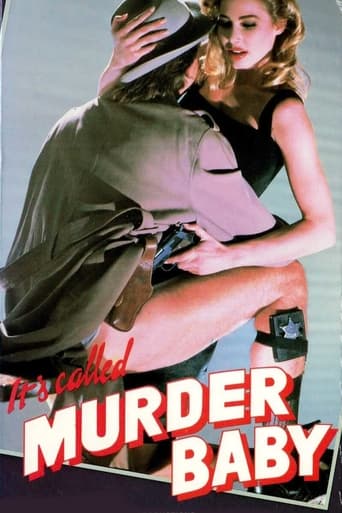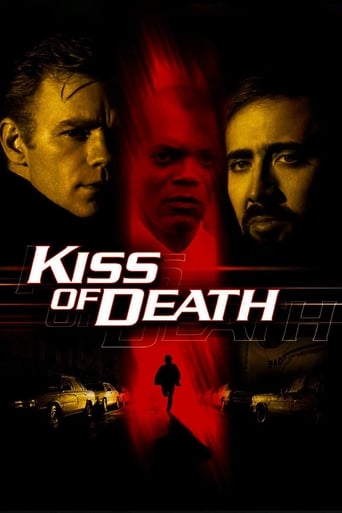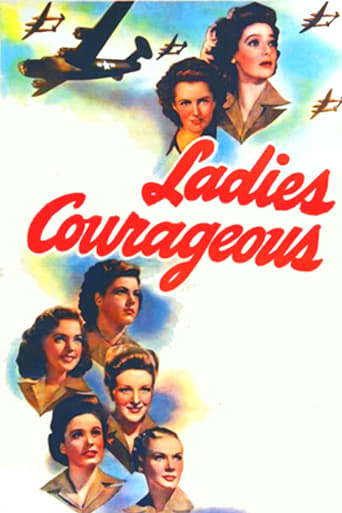A Soldier's Story (1984)
In a rural town in Louisiana, a black Master Sergeant is found shot to death just outside the local Army Base. Military lawyer, Captain Davenport—also a black man—is sent from Washington to conduct an investigation. Facing an uncooperative chain of command and fearful black troops, Davenport must battle with deceit and prejudice in order to find out exactly who really did kill the Master Sergeant.
Watch Trailer
Cast
Similar titles
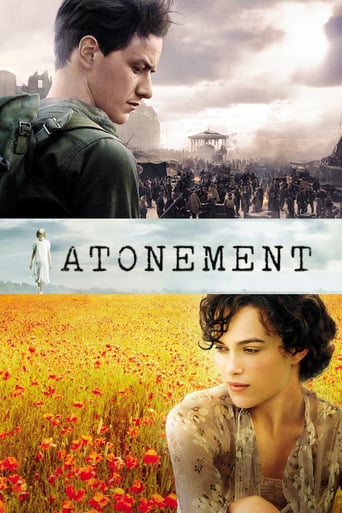
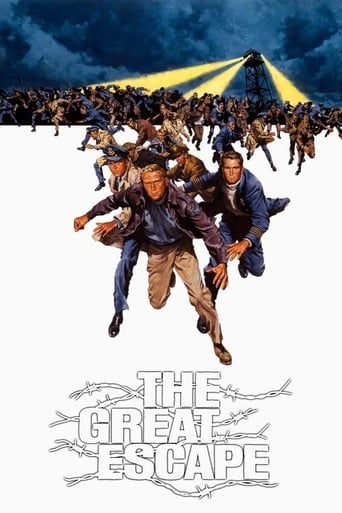

Reviews
Save your money for something good and enjoyable
Powerful
best movie i've ever seen.
The acting is good, and the firecracker script has some excellent ideas.
Pros 1. Howard E. Rollins does a fine job commanding the center of this story. It reminds me a little of his work as Coalhouse Walker Jr. in Milos Forman' 1981 film Ragtime: another movie based on a play about an African-American man seeking justice in a racist world. Thankfully Captain Davenport is a lot more level-headed that Coalhouse. Though when you think about it: Peterson is more like Coalhouse in the sense that Coalhouse only became homicidal after his innocent wife was killed and Peterson would never have killed Sergeant Waters if Water had't have had a hand in CJ's demise.2. No review of Soldier's Story is complete without praise for Adolph Caesar's wonderful Oscar-nominated performance as Sergeant Waters. He brings complexity to the role to make Waters more than just a self-serving a-hole. You can tell that his racial views are damaging him long before anybody every thought of killing him.3. Coming from director Norman Jewison, it's not hard to see similarities between this film and "In The Heat Of The Night": an African American going down south and dealing with racism while he seeks justice for a crime. To avoid too much comparison with "In The Heat Of The Night", Jewison wisely focuses more on conflicts between African Americans than racial tension. Not that the racial tension isn't there, it certainly is. 4. The movie is a powerful exploration of how racism can cause disharmony even within a race. Sergeant Waters no doubt endured a lifetime of racism and rather than fighting back, he lashed out at other African Americans for making the race look bad and things only got ugly from there. Captain Davenport seeks justice but admits at the end that he was a little too quick to suspect that Caucasian soldiers did Waters in.5. The music is superb. Patti Labelle was worth every penny. The fact CJ could play so well made it all the more tragic his talent never survived the war. 6. It's good that they do have decent Caucasians in the movie like the superior officer who forced the Caucasian soldier to obey Captain Davenport during his interrogation and the soldier who told his friend to leave Sergeant Waters alone since Waters was obviously drunk.7. Best Line: Davenport: Who Gave You The Right To Judge? To decide who is fit to be a negro and who is not?Cons 1. It's a little confusing because one moment it's established that Waters seemed to like CJ (they have a pleasant conversation in the bar) than the rest of the story claims Sergeant Waters has special scorn for him. 2. After CJ's death, the soldiers throw the last game in revenge for CJ. All it does is deny them a chance at playing The Yankees so it seems to hurt themselves more than the superior officers.
I suppose the big thing for this movie is that most of the actors are black and it seeks to portray conditions in the military during the time of WWII.I, on the other hand, was just looking to watch a good murder mystery.What I got was the equivalent of "In The Heat Of The Night" if it was put on by your local amateur dramatics society.The murder story is nothing startling or new. Somebody is killed, various people are suspected and eventually the guilty person is found. You can do your own guessing, but it doesn't take an Einstein.What put me off is that the acting is not very good. Other than the Sargent I didn't feel that any of the characters offered anything beyond the clichéd characters role they were handed.
Who murdered Sgt. Waters? This is the mystery posed at the outset of "A Soldier's Story," as we see Waters—speaking incoherently and obviously intoxicated—being shot to death on a country road. The setting is Tynin, Louisiana, and the year is 1944, near the end of WWII. Tynin, like the rest of the Deep South, is a town plagued by racial segregation and Klan terrorism. That said, everyone on the Tynin army base, both black and white, has no doubt that the black sergeant's killing was at the hands of white racists, some are even certain that it was the work of the KKK.Enter Capt. Davenport, a Negro army officer/lawyer assigned by Washington to investigate Waters' killing. No stranger to racial hostility himself, he perceives himself as a crusader, out to see that justice—ultimately racial justice--is served for the murder. However, he has the unfortunate experience of learning that internal black racism can be just as hostile and damaging as the external racism historically afflicted by white society.Howard Rollins plays Capt. Davenport, the no nonsense, stoic black army officer investigating Waters' murder, and Dennis Lipscomb plays Captain Taylor, the late Waters' white commanding officer, who, like Davenport, desperately wants Waters' killers prosecuted. However, Taylor earnestly tries to persuade Davenport to relinquish the investigation, believing that as a black man, there's no way that Davenport can possibly "get at the truth" behind the killing.But it is Adolph Caesar who commands most of your attention throughout this movie in the role of the sadistic Sgt. Vernon Waters. The mystery of Sgt. Waters' murder is the focal point of "A Soldier's Story," and, fittingly, Caesar is "the man" of this movie. Through a series of film flashbacks of Waters, via Davenport's interviews with black soldiers of Waters' platoon and Captain Taylor, we learn that Waters was an intensely embittered, disillusioned black master sergeant who believed that Southern blacks, perpetuating stereotypes of minstrelsy and ignorance, impede the black race from attaining acceptance and respect from white society. That said, he embarks on his own personal crusade to rid the black race of such dregs so that the race can prosper and progress.With his raspy, deep voice, Caesar spent most of his career doing narrations for Hollywood productions. (While hearing him deliver his lines in this movie, and if you're over 45, you can't help but to reminisce about the classic tag line he delivered in TV commercials for the United Negro College Fund way back in the day—"A mind is a terrible thing to waste.") But it is in this role as Sgt. Waters in "A Soldier's Story" that Caesar displays his powerful talent as a dramatic actor, in a role that would eventually become his signature. It is with his penetrating voice that he effectively embodies the hatred and bitterness that personifies the Waters' character. Although small in stature, his screen presence is commanding, and at times even chilling, particularly when he vents his animosity and sadism toward the Southern Negroes of his platoon, whom he deprecatingly refers to as "geeches." It is a hatred so intense that as Pvt. Wilke (Water's subordinate) explains to Davenport, "You could just feel it." Caesar would go on to win a well-deserved Academy Award nomination for "Best Supporting Actor" for his portrayal of Sgt. Waters in "A Soldier's Story," a performance that would make him a star overnight. Unfortunately, he would suffer an untimely death two years after the movie was released, just as he was coming into his own as a Hollywood celebrity.In what was only his second appearance in a Hollywood movie, Denzel Washington delivers a solid performance as "Pvt. Peterson," the outspoken and assertive soldier from Alabama, totally unafraid to challenge Waters' bigotry toward the Southern black soldiers. In stark contrast to Peterson, veteran actor Art Evans plays Pvt. Wilkie, Waters' docile and acquiescent flunky, who, in an effort to regain his rank of sergeant, a rank Waters had stripped, is more than willing to facilitate the sergeant's dastardly deeds.In one of the movie's most memorable performances, Larry Riley plays "C.J. Memphis," a Mississippi farmhand turned soldier who becomes the most unfortunate and tragic victim of Water's malevolence. Although engaging and exceptionally talented, both musically and athletically, Memphis is obviously the most illiterate and "uncultured" soldier of Waters' platoon, and a rube too naïve to realize that of all of the Southern soldiers, he's the "geeche" that Waters despises most.In addition to the movie's intriguing drama and suspense, "A Soldier's Story" features prime musical entertainment. Iconic R&B vocalist Patti LaBelle plays "Big Mary," owner of a bar where the black soldiers from the army base frequent. Her mesmerizing blues/gospel singing, coupled with Riley's own fine Mississippi Delta blues singing and guitar playing, makes for some of the movie's most entertaining moments.Charles Fuller, the playwright of "A Soldier's Story" and screenwriter for this movie, did quite a fine job of transitioning his Pulitzer-Prize winning play to the big screen, and the added dimensions of cinema greatly enhances his story. However, even though the story is intended to be a "whodunit," you'll most likely gather who murdered Waters before it is revealed at the end of the movie.Nevertheless, "A Soldier's Story" is a truly compelling tale, and the magnificent performances delivered by the cast alone, a cast that would be perceived by many today as "all-star," will have you wanting to watch this movie over and over again.
Fear, pain and anxiety bottled up in one insurmountable scope detailing the plight of the black political journey in a time where radical thoughts are called on to produce positive change. Great examples of the changing of the times thru the eyes of the aggrieved. What was thought to be socially acceptable by those without vision is instead exploited and exposed as hindrance not glory. The details in this film are on display by brilliant actors. The actions are quite believable where a light is fixed on the quality of authenticity of military conduct buried deep in the south. The entire film is not sad, there are performances by Patti LaBelle and a genuine feel the south. Though loyalty is recognized as the standards of propriety or morality, betrayal is exposed thru the story for the sake of justice.
